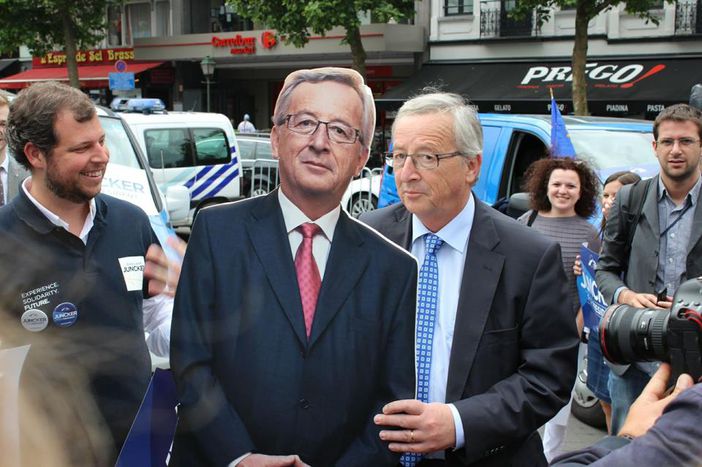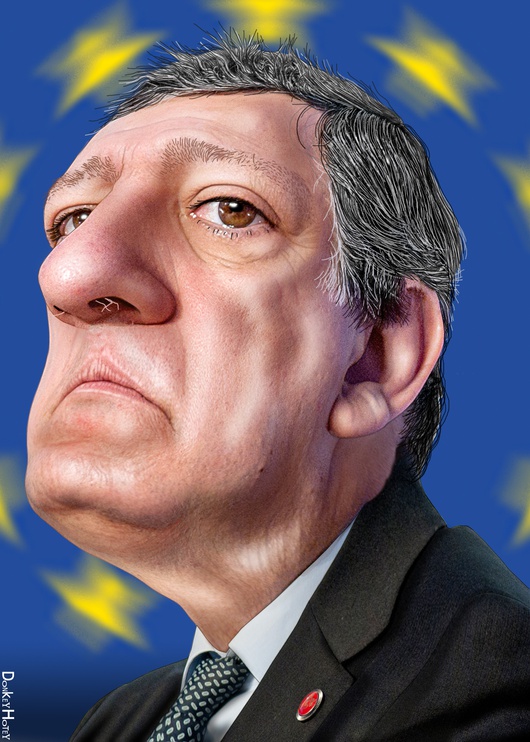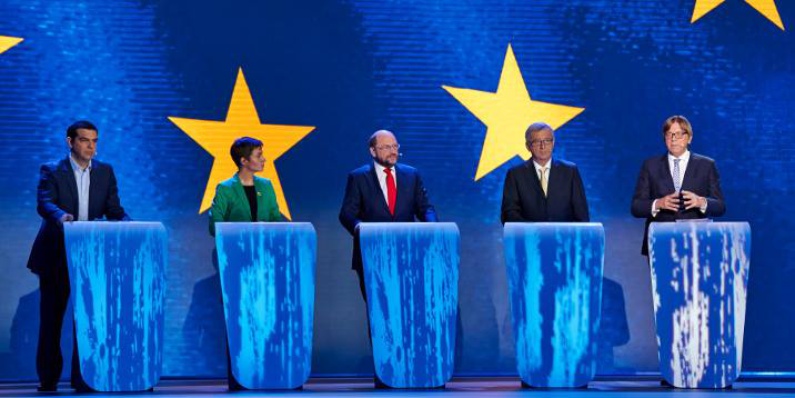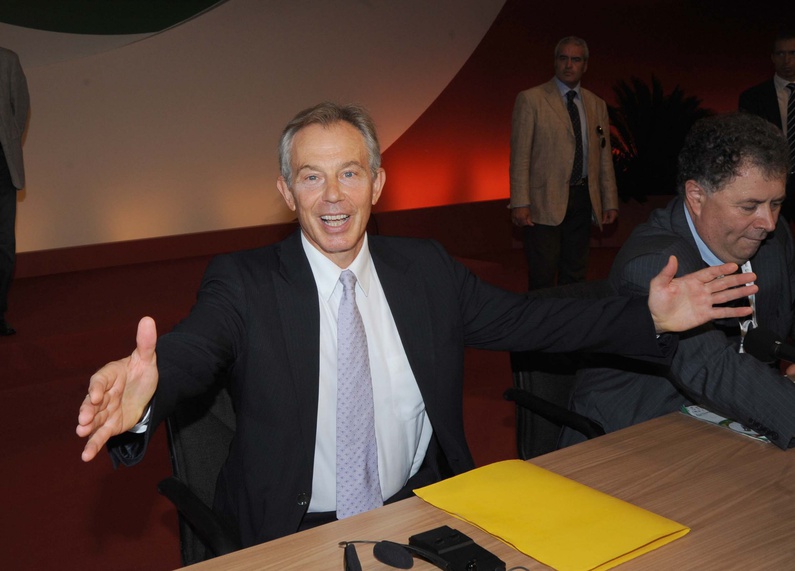
Europe has spoken but it didn’t say Juncker
Published on
Martin Schulz, Guy Verhofstadt, Jean-Claude Juncker, Ska Keller, Alexis Tsipras. There is a good chance that these names do not ring a bell even though you may have indirectly voted for them in the European elections. The European Parliament now considers Juncker the rightful heir of current Commission president Barroso. But they are wrong.
Event A: five political groups in the European Parliament put forward a leading candidate for the post of Commission president before the European elections.
Event B: EU citizens vote in European elections without knowing these candidates and without knowing how their vote could influence the next Commission presidency.
Query: On what plane of existence do these events lead to a democratically elected Commission president?
What is what? Who is who?
Martin Schulz, Guy Verhofstadt, Jean-Claude Juncker, Ska Keller, Alexis Tsipras. There is a good chance that these names do not ring a bell unless you are employed in Brussels, a student of EU politics, or a close family member, but it is possible that you indirectly voted for them in the European elections. For the purpose of full disclosure: Juncker leads the party group with the most seats in Parliament and his colleagues believe that he is the rightful heir of current Commission president Jose Manuel Barroso.
But they are wrong. The European Parliament has tried to influence the choice for the next head of the EU’s executive branch by simplifying a complicated procedure. There is, however, another way to look at the election results which indicates that Juncker would be the worst possible choice for the Commission presidency.
If the EU’s leaders can take away one thing from the outcome of the European elections, it would be that citizens are unhappy with the EU’s current path. They are not necessarily anti Europe, but France and Britain’s swing to the far right and Portugal and Greece’s move to the left indicate that a status quo is no longer acceptable. The vote for extremes is a vote against austerity.
 Electing Juncker, a conservative Christian democratic clone of Barroso who is possibly even more colourless and uncharismatic, would therefore be problematic. The former prime minister of Luxembourg does not, in any way, personify a change in EU policy. To counter Eurosceptics, Europe needs a leader that can inspire hope: a symbol of a dynamic Europe.
Electing Juncker, a conservative Christian democratic clone of Barroso who is possibly even more colourless and uncharismatic, would therefore be problematic. The former prime minister of Luxembourg does not, in any way, personify a change in EU policy. To counter Eurosceptics, Europe needs a leader that can inspire hope: a symbol of a dynamic Europe.
The EPP’s choice for Juncker has thus posed the European Council with a problem in that he is now the most lobbied and least desirable person for the post. The search for a new president of the Commission may therefore be back at square one.
If the European Council decided to waive Juncker’s claim to the throne, it might result in a little dissatisfaction from people who will criticise the fact that the Commission president will once again be undemocratically chosen.
This criticism would be misplaced though. Considering Juncker a democratically elected Commission president would presuppose that people consciously voted for an EPP party knowing their vote would also be a vote for Juncker.
This is not the case. EUobserver took to the streets in five different member states and confirmed that which we already knew: very few people have heard of the Spitzenkandidaten and fewer still were aware of how their vote in the elections could influence the next Commission presidency.
 Moreover, the election results give the European leaders plenty of reason to defend their decision to ignore Juncker. His political group lost 61 of its MEPs, more than any other group. Combined with a stronger left block and more far right politicians in the Parliament, appointing someone else could still be explained as having listened to the voter.
Moreover, the election results give the European leaders plenty of reason to defend their decision to ignore Juncker. His political group lost 61 of its MEPs, more than any other group. Combined with a stronger left block and more far right politicians in the Parliament, appointing someone else could still be explained as having listened to the voter.
But to avoid the same problem with other nominees, they will have to select someone from the outside. After all, a strong objection to the nomination of Schulz, Verhofstadt, and Juncker as candidates for the Commission presidency was that, despite being from different party groups, they are more or less the same. All of them are European federalists that were considered too much embedded in the Brussels bubble.
This is exactly what made people choose for extremist parties in the first place. If people want change and they are not able to distinguish between social democrats, Christian democrats and liberals, they will inevitably end up voting for someone with a different sound.
But who else?
Many alternatives have been reviewed in the past week. IMF top executive Christine Lagarde has frequently been linked to the job while, most recently, her party member Michel Barnier and former Dutch prime minister Jan Peter Balkenende are rumoured to be possible ‘compromise candidates’. The problem with Lagarde, Barnier, and Balkenende is that they are all centre-right politicians favouring austerity measures.
Enrico Letta, a left-leaning Christian democrat from Italian prime minister Renzi’s party, may therefore be more suitable. However, with Mario Draghi as current president of the European Central Bank it is statistically unlikely that another high profile position will go to an Italian.
Tony Blair might be an excellent candidate too. He may divide public opinion at home but he could nonetheless be the charismatic figure that can convincingly make the pro Europe argument.
 In the end the European Council might still go with Juncker and comfort itself with the thought that the Commission president is not the only top job in Brussels. This would be a mistake. The EPP’s victory was a Pyrrhic victory and the fact that its influence in the Parliament decreased by 22% reconfirms that Christian democracy is declining in Europe. In addition, it would be very optimistic to conclude that Juncker has a democratic mandate when the overwhelming majority of voters outside Brussels have never even heard of him.
In the end the European Council might still go with Juncker and comfort itself with the thought that the Commission president is not the only top job in Brussels. This would be a mistake. The EPP’s victory was a Pyrrhic victory and the fact that its influence in the Parliament decreased by 22% reconfirms that Christian democracy is declining in Europe. In addition, it would be very optimistic to conclude that Juncker has a democratic mandate when the overwhelming majority of voters outside Brussels have never even heard of him.
The new head of the Commission has to be a break from conservative austerity policy; a powerful leader that can challenge anti-EU rhetoric. At the same time, this new face of Europe should be willing to push through necessary reforms instead of plunging Europe into a federation when its citizens are pulling on the handbrake. Juncker does not have any of these qualities.
Europe has spoken, but instead of putting words into the mouths of its citizens, EU leaders should listen to what they really said: end austerity, pause integration, start reforms.



